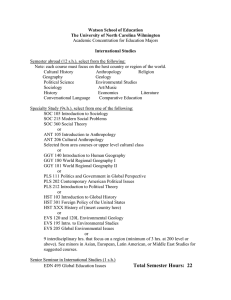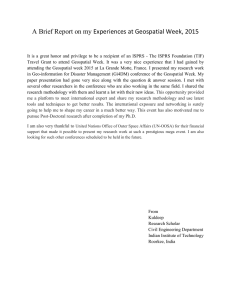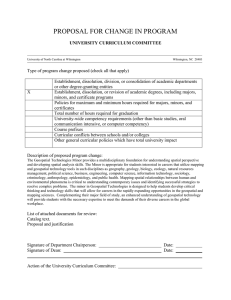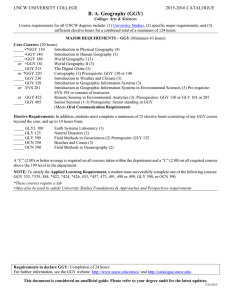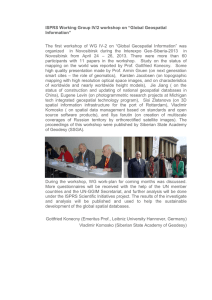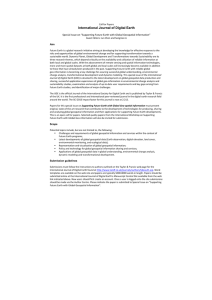University of North Carolina Wilmington PROPOSAL FOR UNDERGRADUATE CURRICULUM CHANGE
advertisement
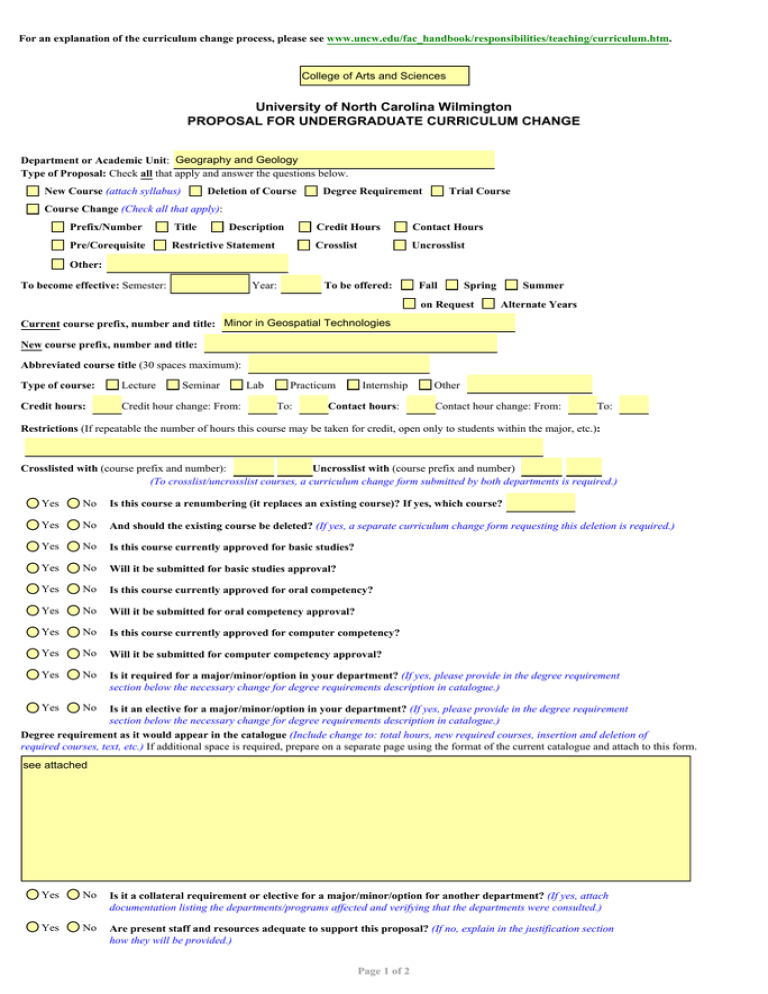
For an explanation of the curriculum change process, please see www.uncw.edu/fac_handbook/responsibilities/teaching/curriculum.htm. College of Arts and Sciences University of North Carolina Wilmington PROPOSAL FOR UNDERGRADUATE CURRICULUM CHANGE Department or Academic Unit: Geography and Geology Type of Proposal: Check all that apply and answer the questions below. New Course (attach syllabus) Deletion of Course Degree Requirement Trial Course Course Change (Check all that apply): Prefix/Number Title Description Pre/Corequisite Restrictive Statement Credit Hours Contact Hours Crosslist Uncrosslist Other: To become effective: Semester: Year: To be offered: Fall Spring on Request Summer Alternate Years Current course prefix, number and title: Minor in Geospatial Technologies New course prefix, number and title: Abbreviated course title (30 spaces maximum): Type of course: Lecture Seminar Credit hours: Credit hour change: From: Lab Practicum To: Internship Contact hours: Other Contact hour change: From: To: Restrictions (If repeatable the number of hours this course may be taken for credit, open only to students within the major, etc.): Crosslisted with (course prefix and number): Uncrosslist with (course prefix and number) (To crosslist/uncrosslist courses, a curriculum change form submitted by both departments is required.) Yes No Is this course a renumbering (it replaces an existing course)? If yes, which course? Yes No And should the existing course be deleted? (If yes, a separate curriculum change form requesting this deletion is required.) Yes No Is this course currently approved for basic studies? Yes No Will it be submitted for basic studies approval? Yes No Is this course currently approved for oral competency? Yes No Will it be submitted for oral competency approval? Yes No Is this course currently approved for computer competency? Yes No Will it be submitted for computer competency approval? Yes No Is it required for a major/minor/option in your department? (If yes, please provide in the degree requirement section below the necessary change for degree requirements description in catalogue.) Yes No Is it an elective for a major/minor/option in your department? (If yes, please provide in the degree requirement section below the necessary change for degree requirements description in catalogue.) Degree requirement as it would appear in the catalogue (Include change to: total hours, new required courses, insertion and deletion of required courses, text, etc.) If additional space is required, prepare on a separate page using the format of the current catalogue and attach to this form. see attached Yes No Is it a collateral requirement or elective for a major/minor/option for another department? (If yes, attach documentation listing the departments/programs affected and verifying that the departments were consulted.) Yes No Are present staff and resources adequate to support this proposal? (If no, explain in the justification section how they will be provided.) Page 1 of 2 College of Arts and Sciences University of North Carolina Wilmington PROPOSAL FOR UNDERGRADUATE CURRICULUM CHANGE Course description change as it would appear in the catalogue (Course description change: 50 words or less; include prefix, number, title, credit hours, crosslisting, pre/corequisites, etc.) Justification for request or degree change: Yes No Does this proposal require University Curriculum Committee (UCC) or Faculty Senate approval (refer to http://www.uncw.edu/facsen/ucc/)? (If yes, after college/school curriculum committee approval, forward proposal to the UCC and complete and submit the appropriate UCC form(s). If approved, this proposal must be signed by the UCC Chair and Faculty Senate President and forwarded to the Provost.) Recommended and approved by: _________________________________________________ Dean of the College or School Date _________________________________________________ Department Chairperson Date _________________________________________________ *Chair, University Curriculum Committee Date _________________________________________________ Chair, College or School Curriculum Committee Date _________________________________________________ *President, Faculty Senate Date _________________________________________________ Teacher Education Council (WSE use only) Date _________________________________________________ Provost Date *Obtain signatures of the UCC Chair and the Faculty Senate President only if required for this proposal. Forms not filled out completely or lacking documentation will be returned. Print Form Clear Form E-mail Form Page 2 of 2 Minor in Geospatial Technologies August 2009 The Geospatial Technologies Minor provides a multidisciplinary foundation for understanding spatial perspective and developing spatial analysis skills. The Minor is appropriate for students interested in careers that utilize mapping and geospatial technology tools in such disciplines as geography, geology, biology, ecology, natural resources management, political science, business, engineering, computer science, information technology, sociology, criminology, anthropology, epidemiology, and public health. Mapping spatial relationships between human and environmental phenomena is critical to understanding contemporary issues and identifying successful strategies to resolve complex problems. The minor in Geospatial Technologies is designed to help students develop critical thinking and technology skills that will allow for careers in the rapidly expanding opportunities provided by geospatial and mapping sciences. Complementing their major field of study, an enhanced understanding of geospatial technology will provide students with the necessary expertise to meet the demands of their diverse careers in the global workplace. Requirements for a Minor in Geospatial Technologies: requires a minimum of 21 credit hours including 9‐10 hours of core courses and 12 hours of electives. At least 6 hours of electives must be in courses at the 300 level or above. Students must earn at least a “C” (2.00) average in courses counted towards the Geospatial Technologies minor. This minor is available for students majoring in any discipline including geography and geology. A maximum of 12 credit hours counted toward a student's major may be applied toward completion of core or elective requirements in Geospatial Technologies. Required Core Courses (9‐10 credits): GGY 215 (3): The Digital Globe or GGY 220 (3): Cartography GGY 222 (3): Quantitative Methods in Earth Sciences or STT 215 (3): Introduction to Statistics GGY 328 (3): Introduction to Geographic Information Systems or EVS 281 (4): Introduction to GIS in Environmental Studies If a student completes both GGY 215 and GGY 220, GGY 215 will count towards the core requirements and GGY 220 will count as an elective. Electives (12 credits): At least 6 hours at 300‐level or above ANT 311 (3): Field Methods in Archaeology (3‐6 credits, but only 3 count towards the minor) BIO 366 (3): Ecology BIOL 366 (1): Ecology Laboratory BIO 466 (3): Conservation Biology BIO 478 (3): Global Environmental Problems BIO 480 (3): Field Studies in Biology (1‐6 credits, but only 3 count towards the minor) CSC 332 (3): Data Structures CSC 370 (3): Computer Graphics CSC 415 (3): Artificial Intelligence CSC 455 (3): Database Management GGY 205 (3): Practical Methods in Geography GGY 424 (4): Advanced GIS GGY 426 (4): Environmental GIS GGY 422 (3): Remote Sensing in Environmental Analysis GLY 171 (3): Applied Physical Geology GLY 200 (3): Methods in Geology GLY 220 (3): Field Methods in Environmental Sciences GLY 470 (6): Field Course in Geology MIS 213 (3): Introduction to Information Systems and Technology MIS 315 (3): Management of Database Systems Other courses (such as GGY 498 and 499) may be applied towards the minor at the discretion of the Geospatial Technologies minor coordinator or the Chair of the Department of Geography and Geology. Justification: Complementing their major field of study, an enhanced understanding of geospatial technology will provide students with the necessary expertise to meet the demands of their diverse careers in the global workplace. The minor in Geospatial Technologies has a specific focus on digital mapping and spatial analysis techniques, but it is also beneficial for students who pursue careers utilizing this technology to have a foundation in computer science and information technology, as well as field‐based, or real‐world experience conducting mapping projects. Therefore, this minor is interdisciplinary and as such, any major at UNCW can enroll. Because this minor is available to students majoring in any discipline at UNCW including geography and geology, a maximum of 12 credit hours counted toward a student's major may also be applied toward completion of core or elective requirements in the Geospatial Technologies minor.
